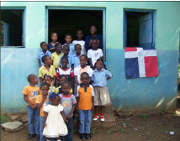
Dominican Republic (MNN) — Batey
communities in the Dominican Republic are company towns or neighborhoods where
sugar cane workers and their families live.
Sugar production is physically
demanding and low-paying work. An
estimated 250,000 residents live in approximately 500 bateys throughout the
Dominican Republic.
Most residents do not have access
to drinking water, proper sanitation facilities, medical care, or schools. A majority of the adults are illiterate. Many have dreams for their children that will
never be fulfilled without an education, but 22% of the kids in the Dominican
Republic don't go to school because their parents' wages won't cover the fees.
Worldwide Christian Schools, in
partnership with the Christian Reformed World Missions and COCREF (Christian
Reformed Schools of the Dominican Republic), began responding with small schools
in the shantytowns.
In 1988, Jerico Christian School
began classes in the tiny Christian Reformed Church in Batey Fao. 15 years later, Worldwide Christian Schools
built a four-classroom building not far from the church. In 2004, bathrooms were added and a security
wall was finished. Currently, Jerico serves students from preschool through 5th
grade and is growing.
Steve Geurink with WWCS says, "There is just a large number of students who are not able to attend either public or
Christian schools. Our program is
focusing on these individual students and trying to get all the children from a
family to be able to go to school at the same time."
"Hope Rising" is a joint program of Worldwide Christian
Schools – US, Christian
Reformed World Missions, and COCREF that connects
one sponsor with one student in the Dominican Republic.
But there's a twist to the program.
Geurink explains, "If we pick one child in a family to sponsor, we make a
commitment to make sure that all the other children are sponsored as well."
In other words, "Our goal is to
make sure that a school is completely sponsored–or close to that–before we move on to the next one, rather
than have, for example, three or four [sponsored students] at one school and maybe five or six sponsored [students] at another. We want to impact one community at a time."
Hope Rising focuses on providing
access to Christ-centered education, which means that "we'll produce a future
for children that are literate, and have a better understanding of their world,
plus being exposed to Christ,"says Geurink.
Most importantly, the discipleship
is done through the indigenous believers connected with the program. "The
teachers themselves are the disciplers. When they're doing the teaching,
they're the ones that are concerned about the individual children. They are concerned about the development of
these children and the Christian faith within the curriculum setting."
The price tag for a future? Not much more than a cup of coffee at a fast
food restaurant. "It's about a dollar a day to put a kid in school. The
children are given an education, many times a lunch, and their materials they need
for school." Click here if you can
help.
